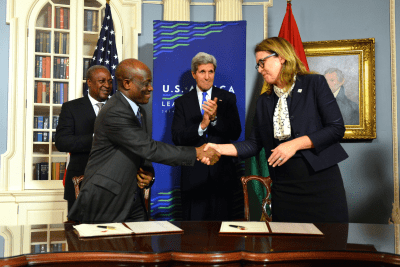The World Bank Group’s Board of Executive Directors Tuesday approved the Ghana Public Financial Management Reform Project to support the Government of Ghana achieve tangible improvements in budget credibility, strengthening of public investment management system; and containment of fiscal risk.
The International Development Association (IDA) credit of US$45 million aims to instill improved financial management information systems, including the consolidation of gains from the Ghana Integrated Financial Management Information System implementation; of procurement planning; strengthening of internal management of Ministries, Departments and Agencies, and Metropolitan, Municipal and District Assemblies.
The project will seek to strengthen financial oversight and accountability, including the capacity of the Ghana Audit Service (GAS) to expand its work at Metropolitan, Municipal and District Assemblies levels as well as to build its proficiency to audit Information and Communications Technology (ICT) based financial information systems.
Bolstered by high gold and cocoa prices and new oil production, Ghana’s economic growth peaked at 14 percent in 2011. But a combination of external and domestic imbalances contributed to economic instability, fueling Government debt and inflation, a sharp depreciation of its currency, and a weaker pace of economic growth.
High levels of debt, large fiscal deficits, and lack of fiscal space for public investments are major constraints to Ghana’s economic growth, said Yusupha B. Crookes, World Bank Country Director for Ghana. The reforms supported by todays project focus on critical and priority areas of the Government that together could facilitate transparent and accountable fiscal governance in Ghana.
Building upon the institutional and operational strengthening accomplished under the Ghana Integrated Financial Management Information System project, this project will support the Government’s Public Financial Management systems and controls to enable them to function as tools for improved fiscal management and budgetary control. Information technology upgrades will help improve cash and debt management, and boost timely and accurate reporting for better economic management.
The project also aims to strengthen the credibility of the national budget by supporting the design of a charter that will establish the principles, roles and obligations of key stakeholders in a sound budget process. To improve formation and execution of the budget, the project supports activities to improve information sharing between the offices responsible for revenue forecasting and fiscal analysis. The key beneficiaries of the project include the Legislature, and several government fiscal offices such as the Ministry of Finance, and service delivery Ministries, departments and agencies as well as Metropolitan, Municipal and District Assemblies.
Ghana has invested in programs aimed at strengthening Public Financial Management in government, but significant institutional, policy, and system weaknesses continue to manifest themselves limiting the impact of these reforms, said Ismaila B. Ceesay, World Bank Task Team Leader for this Project. The project can help facilitate the reversal of the current trend of fiscal imbalances impacting the economy while improving the delivery of basic services to the many poor families living in Ghana.
FRENCH VERSION
Le crédit de l’Association internationale de développement (IDA)d’US$ 45 millions vise à inculquer l’amélioration financièreinformatique de gestion, y compris la consolidation des gainsprovenant de la mise en œuvre du Ghana Financial Managementsystème intégré ; de la planification des achats ; renforcement dela gestion interne des ministères et organismes et Metropolitan,Municipal et assemblées de District.
Le projet s’efforcera de renforcer la surveillance financière etreddition de comptes, y compris la capacité de la Ghana AuditService (SAP) à élargir ses travaux au Metropolitan, les taxes municipales et les assemblées de District ainsi qu’aux construiresa compétence pour la vérification des informations et desCommunications (TIC) base de systèmes d’information financière.
Soutenue par l’or haut et cacao prix et nouvelle production depétrole, la croissance économique du Ghana a atteint 14 % en2011. Mais une combinaison des déséquilibres extérieurs etintérieurs ont contribué à l’instabilité économique, alimentant ladette publique et de l’inflation, une forte dépréciation de samonnaie et un rythme plus faible de la croissance économique.
Des niveaux élevés de dette, déficits budgétaires importants et lemanque de budget réservée aux investissements publics sont lesprincipaux obstacles à la croissance économique du Ghana, a déclaré le directeur de pays de Yusupha Crookes B., Banquemondiale pour le Ghana. Les réformes pris en charge par prioritéet aujourd’huis projet focus sur la critique du gouvernement quiensemble pourrait faciliter la gouvernance budgétaireresponsable et transparente, au Ghana, les zones.
S’appuyant sur le renforcement institutionnel et opérationnelréalisé dans le cadre du projet Ghana Financial Informationsystème de Management intégré, ce projet appuiera les systèmesde gestion des finances publiques du gouvernement etcommandes pour leur permettre de fonctionner comme outilspour améliorer la gestion financière et contrôle budgétaire.Information technologie travaux contribuera à améliorer lagestion de trésorerie et de la dette et Poussée opportuns etprécis des rapports pour améliorer la gestion économique.
Le projet vise également à renforcer la crédibilité du budgetnational en soutenant la création d’une Charte qui établira lesprincipes, les rôles et les obligations des parties prenantes dansun processus budgétaire saine. Pour améliorer la formation etl’exécution du budget, le projet soutient des activités visant àaméliorer l’échange d’informations entre les offices compétentspour les prévisions de recettes et analyse financière. Lesprincipaux bénéficiaires du projet comprennent l’Assemblée législative et plusieurs administrations fiscales comme leministère des finances et service livraison Ministries, ministères etorganismes ainsi que Metropolitan, Municipal et assemblées deDistrict.
Ghana a investi dans des programmes visant à renforcer lagestion des finances publiques au sein du gouvernement, maissignificative institutionnel, politique et les faiblesses du systèmecontinuent à manifester en limitant l’impact de ces réformes, a déclaré équipe responsable de la tâche B. Ismaila Ceesay, BMpour ce projet. Le projet peut aider à faciliter l’inversion de latendance actuelle des déséquilibres budgétaires ayant un impact sur l’économie tout en améliorant la prestation des services debase aux nombreuses familles pauvres vivant au Ghana.


